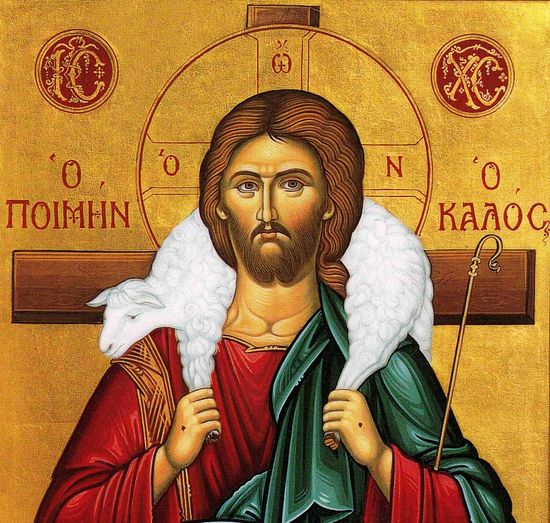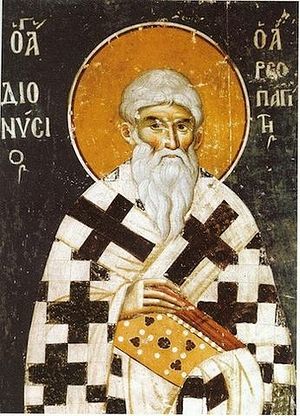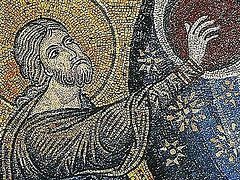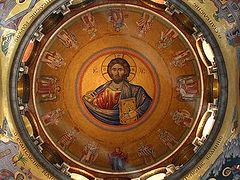How does the Eastern Orthodox Church view and articulate the atonement of our Lord? This question arises from many converts to the Eastern Orthodox Church, particularly here in America. Many come to the Eastern Orthodox Church looking to leave behind what they may consider harsh or even terrifying notions of God unleashing His wrath upon His Son on the cross. This can become strained when they then come to see the Orthodox Church, through Her fathers and hymnography, employ the same terms and verbiage as their former tradition. So, does the Eastern Orthodox Church thus employ a Penal Substitution model of the atonement?
In short, no, She does not. How, then, should we properly order these terms, and their application, to properly understand the Church’s teaching on the atonement? A short gloss of the Evangelical concept of Penal Substitution (from here “PSA”) is that God required someone who was equal to Him in rank to satisfy the breaking of His Law, in order that He might remain just and that there be justice. In this view, God pours out His wrath upon Christ, wrath due to us in our sins, and since Christ is equal to God—since He is God—this satisfies the besmirchment of the Law, that first disobedience of Adam.
There are a lot of terms there, all of which are used by the fathers. However, the Eastern Orthodox Church not only understands these terms in a radically different way than do Evangelicals, they are also radically different in their application. Let’s go through each term, one by one.
What is the Orthodox understanding of justice?
But further, Almighty God is celebrated as justice, as distributing things suitable to all, both due measure, and beauty, and good order, and arrangement, and marking out all distributions and orders for each, according to that which truly is the most just limit, and as being Cause for all of the free action of each. For the Divine Justice arranges and disposes all things, and preserving all things unmingled and unconfused, from all, gives to all existing beings things convenient for each, according to the due falling to each existing thing.
~St. Dionysios the Areopagite, Divine Names, Caput 8.7
St. Dionysios reveals to us that when the Church and the Scriptures employ the term “justice,” it is not a legal term, but one regarding the proper order of things. Divine justice is the perfect intended ordering of the cosmos by God. Divine justice does not only refer to the pre-lapsarian (before “the Fall”) order of the cosmos, but also to the way God originally intended Adam to pastorally guide the cosmos. In the Crucifixion, we are given something more than what Adam had in the Garden.
St. Mark the Ascetic says, “Afflictions bring blessing to man; self-esteem and sensual pleasure, evil” (On Spiritual Law 42, Philokalia vol. 1).
In this world, what we consider pleasure is evil because it is a continuation of the unstructured-ness, or the fallenness of creation. But afflictions in this world are a direct result of the re-ordering to that original and perfect order. As we just went over, this is what we call Divine justice. It would be unjust for God to leave His creation disordered, to leave us in our fallen state. The only just thing for God to do would be to undo it. This undoing, and in fact redoing, causes us affliction, as stated directly above. This affliction some refer to as satisfaction, specifically, the satisfying of the return to the natural order. Where the non-Orthodox tend to use “satisfaction” to refer to something that affects or pertains to God having His wrath “satisfied,” the Church understands satisfaction as something affecting or pertaining to man. We see here that not only is satisfaction understood radically differently, it is applied radically differently.
Why, then, does the apostle say that God is reconciled with man? (cf. Rom 5:10, 2 Cor. 5:18, 5:20, Col. 1:20-21).
But the gifts of the unfailing Power pass on, both to men and living creatures, and plants, and the entire nature of the universe; and It empowers things united for their mutual friendship and communion, and things divided for their being each within their own sphere and limit, without confusion, and without mingling; and preserves the order and good relations of the whole, for their own proper good, and guards the undying lives of the individual angels inviolate; and the heavenly and the life-giving and astral bodies and orders without change: and makes the period of time possible to be.
~St. Dionysios the Areopagite, Divine Names, Caput 8.5
The Superessential Power not only empowers all things—it resides in all things. Man is not only reconciled with Eden, with creation, but creation is reconciled with man. The energizing Power, which is God, and which was before the foundation of the world, is reconciled with man. Paradise, that bosom of Abraham, which is God Himself, which once spit out man, welcomes man. It “reconciles” itself with man. I believe we can even take this further: The Image, which is God, and which we have scarred, reconciles itself with man. The nous, that great and wondrous conduit to things unknown, dark and dirtied as we have made it, is reconciled in man. Our actions, filled with the energizing Power, are one hundred percent ours, and one hundred percent God’s, thus reconciling our actions with God within ourselves.
This wondrous and great gift is also unmerited, which is why Mercy and truth are met together; righteousness and peace have kissed each other (Ps. 85:10). Divine justice, that perfect original ordering of the world, with things living in accordance with their nature, is a direct outflowing of truth: Justice is akin to an energy of truth, a perceiving of that which is true, and mercy is a direct outworking of His justice. As St. Augustine writes in his commentary on the same psalter verse: For if thou not love righteousness, thou shalt not have peace, and as the Beatitude says, Blessed are the merciful, for they shall obtain mercy.
Some may say that I have simply rehashed what is commonly referred to as the Christus Victor model of the atonement, except that Christus Victor still suffers from the same Monergism, that concept that God gives salvation to an individual regardless of his cooperation, as does PSA. As highlighted above both in the commentary by St. Augustine and the Beatitude, these are actions that we ourselves must take. That is why the Orthodox Church espouses a synergistic concept of the atonement. There are actions we must take. Apply this to John 14: I am the Way, the Truth, and the Life—they are intricately woven together. When you are on the Way, that is doing righteous works and learning the proper ordering of things, which is Truth, you are given Life.
This Divine Justice, then, is celebrated also even as preservation of the whole, as preserving
and guarding the essence and order of each, distinct and pure from the rest; and as being genuine cause of each minding its own business in the whole... And since, without missing the mark of the sacred theology, one might celebrate this preservation as redeeming all things existing, by the goodness which is preservative of all, from falling away from their own proper goods, so far as the nature of each of those who are being preserved admits; wherefore also the Theologians name it redemption, both so far as it does not permit things really being to fall away to nonexistence, and so far as, if anything should have been led astray to discord and disorder, and should suffer any diminution of the perfection of its own proper goods, even this it redeems from passion and listlessness and loss.
~St. Dionysios the Areopagite, Divine Names, Caput 8.9
We understand the redemption of the world to be precisely a restoration of it to its original state, while also being a reconciliation of man to God and God to man. Our love for the fallen world, for this improper order, brings affliction upon ourselves. So God, because He is just, in His mercy sends His only Son to redeem the world. He satisfies our fallen state by redeeming and reconciling the world both to and in Himself, but also to and in ourselves. He invites us to become co-workers with Him in this great restoration, and, leading us on the way of righteousness, teaches us truth, and ultimately, grants us life everlasting.






A sacrifice was necessary, indeed, a sacrifice for us, but to the satisfaction of nobody but us, our needs, and only in the measure that this satisfaction of our vital (in the true sense) needs is the good pleasure of God, then, to the satisfaction of God.
Death should be destroyed, but only in a way preserving our free choice, to join the Way (and this means the Cross in this world), teached by the Truth, to Life everlasting.
https://houseofmaedhros.wordpress.com/2017/05/13/the-cross-and-the-resurrection-2/
"Man was led into his captivity when he experienced God's wrath, this wrath being the good God's just abandonment of man. God had to be reconciled with the human race, for otherwise mankind could not be set free from the servitude. A sacrifice was needed to reconcile the Father on high with us and to sanctify us, since we had been soiled by fellowship with the evil one. There had to be a sacrifice which both cleansed and was clean, and a purified and sinless priest" (Christopher Veniamin, trans. Saint Gregory Palamas: The Homilies (Waymart, PA: Mount Thabor Publishing, 2009) p. 124).
"Christ overturned the devil through suffering and His flesh which He offered as a sacrifice to God the Father, as a pure and altogether holy victim -- how great is His gift! -- and reconciled God to our human race" (p.125).
"For this reason the lord patiently endured for our sake a death He was not obliged to undergo, to redeem us, who were obliged to suffer death, from servitude to the devil and death, by which I mean death both of the soul and of the body, temporary and eternal. Since He gave His blood, which was sinless and therefore guiltless, as a ransom for us who were liable to punishment because of our sins, He redeemed us from our guilt. He forgave us our sins, tore up the record of them on the Cross and delivered us from the Devil's tyranny (cf. Col 2:14-15)"( p. 128f)."